|
|
|
Sort Order |
|
|
|
Items / Page
|
|
|
|
|
|
|
| Srl | Item |
| 1 |
ID:
164385


|
|
|
|
|
| Summary/Abstract |
Over the past decades, East Asian states have enjoyed economic development and progress toward democracy through extensive economic transformation: trade and financial liberalization. To explain the theoretical mechanism of these variables, we investigate the direct and indirect effects of globalization on democratic development via economic development. To this end, a two-equation model is specified and estimated using data from 1972 to 2010 for 12 East Asian countries. The results show that globalization has not only a direct effect, but also an indirect effect on democracy via economic development.
|
|
|
|
|
|
|
|
|
|
|
|
|
|
|
|
| 2 |
ID:
164380
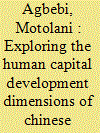

|
|
|
|
|
| Summary/Abstract |
This article uses a case-study approach to discuss the effects of Chinese economic engagement on three dimensions of human capital development: local employment, training and skill building, and knowledge and technology transfer. The study findings suggests that Chinese economic engagement can and does contribute to human capital development in Africa; however, this is dependent on certain sectoral factors and contextual conditions. This study advances a working hypothesis that the human capital development impact of Chinese economic engagement will vary across countries and sectors of the African economy. This working hypothesis seeks to guide further research towards developing a theoretical framework for the study of Chinese economic engagement in Africa and its effects on human capital development. The article also identifies research areas that should be further explored in order to gain a deeper understanding of the impact of Chinese economic engagement in Africa.
|
|
|
|
|
|
|
|
|
|
|
|
|
|
|
|
| 3 |
ID:
164377
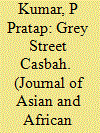

|
|
|
|
|
| Summary/Abstract |
In this paper, I wish to explore the life in the mid-19th to 20th century in the Durban-based Indian Casbah and its enduring legacy. In exploring the Casbah life in Durban, I wish to pay special attention to the narratives of the people who either were associated with it and had living memories of it, or remember the many stories passed on to them by their families.1 The central question that I explore in analysing these narratives is: does Casbah in the diaspora enable the diasporic community to reconnect with their Indian origins or does it orient them away from the romantic attachment to the places of their origin in India? In other words, is Casbah a symbol of a new settlement in which the diasporic community finds lasting meaning and legacy, or does it evoke memories and myths about their origins in India?
|
|
|
|
|
|
|
|
|
|
|
|
|
|
|
|
| 4 |
ID:
164387


|
|
|
|
|
| Summary/Abstract |
This paper explores the predictors of HIV/AIDS awareness and knowledge among older and younger Ghanaian women of reproductive age. Logistic regression was estimated using the 2014 Ghana Demographic and Health Survey data. Results indicate that older Ghanaian women are significantly different from their younger counterparts in terms of the selected socio-economic and demographic characteristics that influence awareness and knowledge of the epidemic. In all, the respondents’ age, region of residence, wealth status, education, marital status and religious affiliation were found to significantly predict knowledge and awareness of HIV/AIDS among women. In addition, pregnancy status and place of residence proved to be significant correlates of HIV/AIDS awareness among Ghanaian women. The study suggests that higher social status is critical in determining whether women of reproductive age are aware of and knowledgeable about the epidemic. Thus, there is the need for policies and interventions to target messages taking into account the varied socio-economic and demographic backgrounds of women in Ghana. Further, health education interventions should be sensitive to the changing technological landscape in order to develop messages that can be delivered via mobile phones, whether as reminders or ringtones, and therefore enhance health knowledge and promote behaviour that brings about desirable health outcomes.
|
|
|
|
|
|
|
|
|
|
|
|
|
|
|
|
| 5 |
ID:
164382
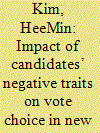

|
|
|
|
|
| Summary/Abstract |
The impact of candidates’ negative traits (CNTs) on voting behavior has received significant attention in election studies in recent decades. However, scholarly efforts have focused primarily on elections in advanced Western democracies, largely overlooking the relationship between candidates’ personal traits and the electorate’s voting behaviors in the context of new democracies. In this study, we fill this gap by investigating the impact of CNTs on the electorate’s vote choices in South Korean presidential elections. Our study of CNTs in South Korea shows that CNTs have statistically significant effects on the electorate’s vote choices. Our findings are particularly relevant because many new democracies are implementing fair and free elections, and the elites under previous authoritarian regimes are running in these elections.
|
|
|
|
|
|
|
|
|
|
|
|
|
|
|
|
| 6 |
ID:
164384
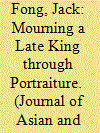

|
|
|
|
|
| Summary/Abstract |
This article employs an urban sociological reading to examine mourning portraiture in the primate city of Bangkok, Thailand, following the death of King Bhumibol Adulyadej (Rama IX). The article argues that Bangkok’s mourning portraiture constructs a reified notion of the Thai nation acceptable to Bangkok’s elites. Through a narrative that sacralizes the late king’s historical exploits for the Thai people, Bangkok’s elites have harnessed the affluent shopping district of Pathum Wan as an aesthetic and political canvas for showcasing the transcendent and virtuous nature of their late monarch. With mourning portraiture as figure and Bangkok’s Pathum Wan as background, the nationalist implications of the imagery as they render sacred the late monarch are considered. The article concludes that the capital city’s sacralization of a deceased king is but an attempt by pro-royalist banking families to reinforce their class linkages to the Thai aristocracy by ‘working towards the monarchy,’ a trajectory illuminated by Serhat Ünaldi, one which I hope to make visible in the post-death context of mourning Rama IX.
|
|
|
|
|
|
|
|
|
|
|
|
|
|
|
|
| 7 |
ID:
164388


|
|
|
|
|
| Summary/Abstract |
Vulnerability to water insecurity in Ghana has often been characterised as a biophysical phenomenon that can be objectively solved using technical and rational approaches to manage water resources use and allocation – thus, making vulnerability to water security discourse politically neutral. Contesting this orthodoxy, this article shows the multiple mechanisms and structures that undergird vulnerability of households to water insecurity in semiarid Ghana. Vulnerability to water insecurity is often veiled in political and economic imbalances that constrain the choices of people in their daily water realities. We argue that a rigid fixation on the biophysical conceptualisation of water insecurity separates nature from society while simultaneously ignoring the lived insecurities resulting from the contours of power. Policy formulation based on this conceptualisation without addressing the access rights and differentiated vulnerabilities could be misleading while yielding minimal impact.
|
|
|
|
|
|
|
|
|
|
|
|
|
|
|
|
| 8 |
ID:
164378
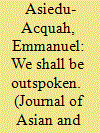

|
|
|
|
|
| Summary/Abstract |
This paper looks at student political activism in Ghana in the late 1950s and 1960s. Using Ghanaian and British archives, it examines how students of Ghana’s universities politically engaged with the government of Kwame Nkrumah and his ruling Convention People’s Party (CPP). Student activism manifested most in the conflict between the Nkrumah government, on one hand, and university authorities and students, on the other hand, over the purpose of higher education, university autonomy, and nationalism. The conflict coalesced around the idea of educated youth as model citizens. Contrary to the denial in existing literature, the paper argues that a nascent student movement and tradition of student political activism had emerged since the late 1950s. University student activism established itself as a fulcrum of the country’s evolving postcolonial political order and a bulwark against governmental authoritarianism. In the larger context of the global 1960s, Ghanaian student activism belonged to the wave of youth protests against governments that favored stability and opposed all dissent.
|
|
|
|
|
|
|
|
|
|
|
|
|
|
|
|
|
|
|
|
|